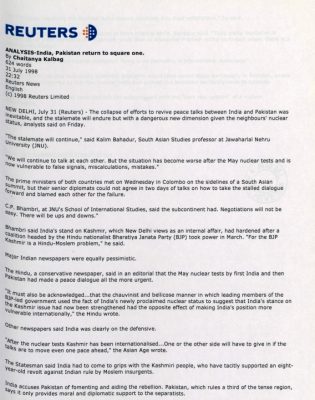ANALYSIS-India, Pakistan return to square one
[Reuters]
Published date: 31st Jul 1998
31 July 1998
Reuters News
English
(c) 1998 Reuters Limited
NEW DELHI, July 31 (Reuters) – The collapse of efforts to revive peace talks between India and Pakistan was inevitable, and the stalemate will endure but with a dangerous new dimension given the neighbours” nuclear status, analysts said on Friday.
The stalemate will continue,” said Kalim Bahadur, South Asian Studies professor at Jawaharlal Nehru University (JNU).
“We will continue to talk at each other. But the situation has become worse after the May nuclear tests and is now vulnerable to false signals, miscalculations, mistakes.”
The prime ministers of both countries met on Wednesday in Colombo on the sidelines of a South Asian summit, but their senior diplomats could not agree in two days of talks on how to take the stalled dialogue forward and blamed each other for the failure.
C.P. Bhambri, at JNU’s School of International Studies, said the subcontinent had. Negotiations will not be easy. There will be ups and downs.”
Bhambri said India’s stand on Kashmir, which New Delhi views as an internal affair, had hardened after a coalition headed by the Hindu nationalist Bharatiya Janata Party (BJP) took power in March. “For the BJP Kashmir is a Hindu-Moslem problem,” he said.
Major Indian newspapers were equally pessimistic.
The Hindu, a conservative newspaper, said in an editorial that the May nuclear tests by first India and then Pakistan had made a peace dialogue all the more urgent.
“It must also be acknowledged … that the chauvinist and bellicose manner in which leading members of the JP-led government used the fact of India’s newly proclaimed nuclear status to suggest that India’s stance on the Kashmir issue had now been strengthened had the opposite effect of making India’s position more vulnerable internationally,” the Hindu wrote.
Other newspapers said India was clearly on the defensive.
After the nuclear tests Kashmir has been internationalised … One or the other side will have to give in if the talks are to move even one pace ahead,” the Asian Age wrote.
The Statesman said India had to come to grips with the Kashmiri people, who have tacitly supported an eight- year-old revolt against Indian rule by Moslem insurgents.
India accuses Pakistan of fomenting and aiding the rebellion. Pakistan, which rules a third of the tense region, says it only provides moral and diplomatic support to the separatists.
We are simply dealing with a people who don’t feel Indian or not sufficiently so,” the Statesman wrote.
“Although it is not certain either that they feel Pakistani.”
The JNU’s Bahadur said Pakistan was not really interested in dialogue. “They want to keep the pot boiling to buttress their argument that the Kashmir dispute needs third-party mediation.”
By Insisting that Kashmir be the cornerstone of any dialogue, Pakistan had painted Itself Into a corner, Bahadur said.
“For Pakistan, resolving the Kashmir issue means resolving it to their satisfaction,” he said.
A multi-ethnic state like India was bound to have internal strife, Bahadur said. “Third-party mediation is Impossible. If India agrees to it in Kashmir, what then in Arunachal Pradesh in the northeast where there is a dispute with China?
Also, who can be a truly neutral mediator? There is no neutrality in international diplomacy.”
Bahadur predicted that eventually economic problems would take centre stage particularly in Pakistan, where the sanctions triggered by the May nuclear tests had pushed the economy perilously close to collapse.
But the Hindu said the May tests had left the subcontinent with the “very real spectre” of a nuclear catastrophe.
“The first step for both sides … is to address the imperative of lowering the threat of nuclear war,” the newspaper said.






